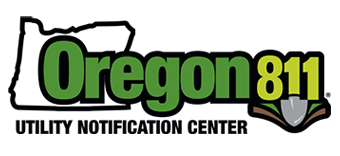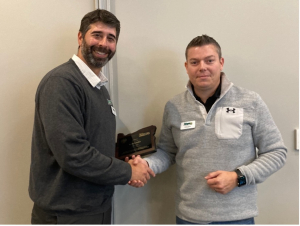Rulemaking: Changes to Oregon Dig Rules in 2025
/in News/by OUNCUpdated 10/20/25
Several proposed rule changes have come before the Governance Committee and the Oregon Utility Notification Center Board of Directors in 2025. Here is a status report on what has been approved, what is pending, and what has been tabled:
The following changes to Oregon Administrative Rules have been approved by the board and incorporated into Oregon Administrative Rules:
- Create OAR 952-001-0005 – this identifies the specific organizations that serve as board recruitment partners that are consulted to select members for the OUNC Board.
- Amend OAR 952-001-0010 (13) – this definition of “non-invasive methods” was enhanced to more specifically include hand digging, air cutting, vacuum excavation and hydro vacuum excavation.
- Amend OAR 952-001-0050 (2) – this change exempts working within a facility enclosure (such as meter boxes and vaults) if not digging beneath the base of the structure.
- Amend OAR 952-001-0010 (23) – this change adjusts the definition of ticket life from 45 days to 30 days. After being referred to the Governance Committee and the Ad Hoc Notification Center Operations Committee, it was approved by the OUNC Board at the July meeting.
- OAR 952-001-0010 (10) – the proposed revision of the “large area” definition has been referred to the ad hoc Notification Center Operations Committee for further discussion. This will be considered after the October 16 board meeting.
- OAR 952-001-0040 – the proposal to allow electronic white lining was tabled indefinitely and is not currently an active proposal. While there was support for the concept, there were concerns about unintended consequences if implemented.
- OAR 952-001-0080 – this proposal was tabled in favor of an operational solution to address the need for facilitating information sharing for design locate requests. These changes are being implemented by One Call Concepts.
At the July meeting, the board voted to initiate a temporary rule change to address recommendations from the Oregon Public Utility Commission ruling (Order 25-093) on complaint NC-405 regarding sewer laterals. This adds a definition of “control over” to OAR 952-001-0010 to align with chapter 952, the Public Utility Commission, Common Ground Alliance Best Practices 21.0 and recommendations, ensuring operators with expertise handle locates and OUNC subscription for their respective underground facilities. Temporary rule changes take effect right away, but with an expiration date. This change is intended to bridge the gap to a more permanent solution by early 2026.
A new printed and online version of the Standards Manual will be introduced once these items are addressed. The current manual is available on our website, and the new version will be available there as well in 2026.
The Oregon Utility Notification Center welcomes public input and involvement, and with the rare and limited exception of executive session, all board and committee meetings are open to attend virtually or in person. If you have questions or need additional information, contact me (OUNC Executive Director Josh Thomas) at [email protected].
- Reducing ticket length from 45 days to 30 days. [amends OAR 952-001-0010 (23)]
- Adding hand digging, air cutting, vacuum excavation or hydro vacuum excavation to the definition of “non-invasive methods.” [amends OAR 952-001-0010]
- Defining “large area” as a project exceeding seven hundred fifty linear feet. [amends OAR 952-001-0010 (10)]
- Allowing for the use of electronic white lining. [amends OAR 952-001-0040]
- Working within a facility enclosure exempted from notification requirement. [amends OAR 952-001-0050 (2)]
- Clarifying design locate request process, delivery of drawings and maps owned by facility operators during planning. [amends OAR 952-001-0080]
- Specifying recruitment partners for OUNC board. [adds OAR 952-001-0002]
The Oregon Utility Notification Center adopts rules that regulate the notification and marking of underground facilities to prevent damage to underground facilities. Written comments on the proposed changes were invited starting January 1, 2024, and public comment was welcomed at the OUNC Board Meeting on July 18, 2024 and October 17, 2024.
2024 Changes to Oregon Dig Rules Proposed
/in News/by OUNC- Reducing ticket length from 45 days to 30 days. [amends OAR 952-001-0010 (23)]
- Adding hand digging, air cutting, vacuum excavation or hydro vacuum excavation to the definition of “non-invasive methods.” [amends OAR 952-001-0010]
- Defining “large area” as a project exceeding seven hundred fifty linear feet. [amends OAR 952-001-0010 (10)]
- Allowing for the use of electronic white lining. [amends OAR 952-001-0040]
- Working within a facility enclosure exempted from notification requirement. [amends OAR 952-001-0050 (2)]
- Clarifying design locate request process, delivery of drawings and maps owned by facility operators during planning. [amends OAR 952-001-0080]
- Specifying recruitment partners for OUNC board. [adds OAR 952-001-0002]
As a part of the rulemaking process, the OUNC will welcome written or in person testimony on these proposed rule changes. A public hearing will be announced soon. If you have questions or need additional information, contact us at [email protected].
Update: 8/7/24
Written comments on the proposed changes have been invited since January 1, 2024, and public comment was welcomed at the OUNC Board Meeting on July 18, 2024. Members will vote on the proposed changes at the OUNC Board Meeting on October 17, 2024, and approved rule changes will take effect on January 1, 2025. If you have questions or need additional information, contact us at [email protected].
OUNC 2022 Annual Report
/in News/by OUNCSafe Digging Month Reminds Oregonians to Contact 811 Before Digging
/in News/by OUNCMedia Release
FOR IMMEDIATE RELEASE
Date: April 5, 2023
pdf for download
Contacts: Josh Thomas, OUNC Executive Director
[email protected], (503) 317-5007
Kandi Young, PUC Public Information Officer
[email protected], (503) 551-5290
Aaron Corvin, Oregon OSHA Public Information Officer
[email protected], (971) 718-6973
SAFE DIGGING MONTH REMINDS OREGONIANS TO CONTACT 811 BEFORE DIGGING
SALEM, Ore. – In recognition of National Safe Digging Month, the Oregon Utility Notification Center (OUNC), Oregon Occupational Safety and Health Division (Oregon OSHA), and Oregon Public Utility Commission (PUC) remind Oregonians to contact 811 before starting projects that require digging.
Whether a professional contractor or do-it-yourselfer, all play an important role in preventing damage to underground utilities. No matter how big or small a project, contact Oregon 811 to avoid life-threatening injuries and prevent costly damage to necessary utility services. There are three easy steps to safe digging in Oregon:
- Submit a locate request at least two business days before starting a digging project at Oregon811.com or by calling 811.
- Wait for utilities to mark the underground lines.
- Dig carefully, paying close attention to the marks.
Once a locate request is made, the OUNC, which operates the free 811 one-call center, notifies the utility companies that serve the area of the planned project. Utility personnel then visit the project site to mark the approximate location of the underground lines, pipes, and cables in the planned digging area at no cost to the homeowner or employer.
Meanwhile, employers must follow Oregon OSHA requirements to protect workers against the potential hazards of underground utilities. Those requirements include:
- Notifying OUNC of the proposed area of excavations at least two working days before starting an excavation.
- Estimating the location of utilities before opening or extending an excavation.
- Determining by safe and acceptable means, the exact location of the estimated utility installations when excavation activities approach them.
- While excavations are open, underground installations must be protected, supported, or removed as necessary to safeguard employees.
Thank you, Ryan Sandhu, for 8 years as Board Member!
/in News/by OUNCRyan Sandhu served as an OUNC Board Member from February 2014 until June 2022, representing Special Districts. He was the Chair for the Executive Director’s Selection Committee, an active member with Publicity, Enforcement, Budget & Audit, and the Board of Directors Secretary for four years.
Ryan’s constant professionalism and skillful communication has been cherished as he helped guide many members while they made tough decisions over the years. His contributions not only increased the strength of the board, but the overall damage prevention effort in Oregon as well. Thank you, Ryan.
Oregonians Urged to Contact 811 Before Digging
/in News/by OUNC Contact: Josh Thomas, Executive Director, Oregon Utility Notification Center
503-317-5007 | [email protected]
This Thursday, August 11 (8/11), is National 811 Day. Also known as National Safe Digging Day, the observance exists to raise awareness about contacting 811 before beginning a digging or excavation project. The Oregon Utility Notification Center, which oversees the statewide call or click before you dig program, is reminding Oregonians that using the free service can save money and lives.
“None of us have x-ray vision to see underground utilities before breaking ground, and we know there are a lot of construction and home improvement projects happening this time of year,” said Josh Thomas, Executive Director of the Oregon Utility Notification Center. “National Safe Digging Day is a perfect time to remind everyone to contact 811 first so they don’t have to call 911.” Read more
Contact Information
Address:
305 N.E. 102nd Avenue, Suite 300
Portland, OR 97220
Phone:
Toll Free: 877-668-4001
Local: 503-232-1987

The OUNC is an official state agency. www.oregon.gov.
Recent News
- April is Oregon Dig Safely MonthNovember 7, 2025 - 2:03 PM
- Rulemaking: Changes to Oregon Dig Rules in 2025January 9, 2025 - 1:33 PM
- 2024 National Safe Digging MonthApril 11, 2024 - 2:08 PM
Submit a Locate Request
ONLINE REQUEST
• Homeowners
• Professional Excavators
PHONE REQUEST
811 or 800-332-2344
 Visit www.call811.com for more info
Visit www.call811.com for more info






